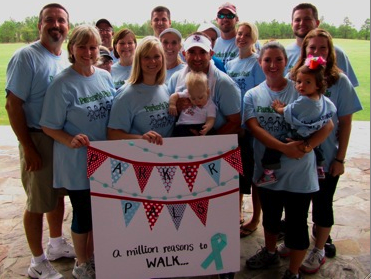- Sections :
- Crime & Public Safety
- Restaurants & Food
- Sports
- More
Categories
The Woodlands will host only Hydrocephalus Association WALK in Texas

THE WOODLANDS, Texas -- Few know and understand what hydrocephalus is, but this September, the Hydrocephalus Association will bring this brain disorder to the forefront with its walk Saturday, September 21. The HA Houston WALK will be hosted at Rob Fleming Park, located at 6055 Creekside Drive, The Woodlands, with the hope of not only raising funds for research, but raising the community’s awareness of hydrocephalus. This Hydrocephalus WALK will be the only one organized by the Hydrocephalus Association to take place in the whole of Texas this year.
Hydrocephalus occurs as a result of an imbalance in the production and absorption of cerebral spinal fluid. The accumulation of fluid applies pressure to the brain compromising functionality and can endanger life if not promptly and properly treated. When detected, the condition is treated promptly; the concern is how hydrocephalus is being treated. Since the 1950s, the dominant method of treatment is the implantation of a shunt. Unfortunately the shunt has a 50 percent failure rate in children within the first two years, and this percentage rate will not improve using a methodology that is over a half-century old.
More than one million Americans live with the challenges of hydrocephalus. Anyone, at any age, can be diagnosed with this life changing, life threatening condition. Currently it is estimated that more than 375,000 elderly Americans suffer from NPH (Normal Pressure Hydrocephalus), many of them have been misdiagnosed as having Alzheimer’s disease, Parkinson’s disease or dementia. When the underlying NPH is treated, the patient often returns to a fully functional life. Although hydrocephalus affects more than one million Americans, in 2012 the U.S. government spent a paltry $6.2 million on hydrocephalus research. However, the cost of pediatric hydrocephalus-related brain surgeries alone tops $2 billion annually. Accurately diagnosing adult hydrocephalus could save Medicare more than $184 million over five years.
The Hydrocephalus Association was founded in 1983 to fund research and services. The past 30 years haven’t raised sufficient money to fund a significant breakthrough and more effort is needed. For that reason an annual fundraiser walk was organized by those affected by hydrocephalus. The 2013 Hydrocephalus WALKs that will be hosted throughout the nation are expected to raise over $1.2 million. The second annual walk in the Woodlands is projected to raise more than $30,000 from over 300 participants. Over 6,000 babies are born with hydrocephalus every year, making more funding essential.
Among those present at the 2013 Houston Hydrocephalus WALK will be the dedicated families and individuals from all over Texas who are affected by hydrocephalus.
“My motivation [to participate] was based on the lack of support I felt in my community and my need to feel that support, and know I wasn’t alone,” says 18-year-old Beach City resident, Jacob Welch.
By the age of two, Jacob underwent six brain surgeries to get his shunt installed and functioning properly. While playing basketball at age fourteen, the slight impact of a basketball to the area of the shunt was enough to tear the shunt tubing. This caused regularly occurring, one to two minute periods of blindness (as a result of brain swelling affecting the optic nerve) before he was taken to a children’s hospital for surgery. The shunt device absorbs excess spinal fluid in the brain and may be life-saving, but it is also very fragile and has a significant chance of malfunctioning.
To have more brain surgeries than birthdays is very common among children with hydrocephalus. For 12-year-old volunteer Austin Matheson, it will take many more birthdays to overcome the number of times he has undergone surgery due to the condition. Austin has had 27 surgeries, several of which were a result of spinal stenosis--a narrowing of the spinal cord caused by hydrocephalus.
“In total, Austin has spent at least 100 days in hospital, but he is a tough guy," Austin's father said. "He never cries after a surgery or feels sorry for himself." Austin will be among the many children affected by Hydrocephalus who will take part on September 21. “Austin is a very loving guy who loves people. A few times in the elevator I’d have to stop him from kissing people from his wheelchair," said his father.
The Hydrocephalus Association (HA) WALK is a 3-kilometer (1.86 miles) walk beginning at 10:00 a.m. Check-in time is 9:00 a.m. Participants will be treated to refreshments, family activities, and enjoy the opportunity to win dozens of prizes including the “Best T-Shirt Design” competition. All walkers raising $50 or more will receive an official HA WALK T-Shirt.
Registering as a team or individual automatically generates a webpage where your family, friends, and coworkers can donate to your cause funding hydrocephalus research. To register for the HA WALK visit the link below and get your donation webpage started, then join the walk on September 21.
Donations can be made through corporate sponsorships, participating in the WALK as a team captain/walker, or through direct donations at Hydrocephalus Association.
Hydrocephalus occurs as a result of an imbalance in the production and absorption of cerebral spinal fluid. The accumulation of fluid applies pressure to the brain compromising functionality and can endanger life if not promptly and properly treated. When detected, the condition is treated promptly; the concern is how hydrocephalus is being treated. Since the 1950s, the dominant method of treatment is the implantation of a shunt. Unfortunately the shunt has a 50 percent failure rate in children within the first two years, and this percentage rate will not improve using a methodology that is over a half-century old.
More than one million Americans live with the challenges of hydrocephalus. Anyone, at any age, can be diagnosed with this life changing, life threatening condition. Currently it is estimated that more than 375,000 elderly Americans suffer from NPH (Normal Pressure Hydrocephalus), many of them have been misdiagnosed as having Alzheimer’s disease, Parkinson’s disease or dementia. When the underlying NPH is treated, the patient often returns to a fully functional life. Although hydrocephalus affects more than one million Americans, in 2012 the U.S. government spent a paltry $6.2 million on hydrocephalus research. However, the cost of pediatric hydrocephalus-related brain surgeries alone tops $2 billion annually. Accurately diagnosing adult hydrocephalus could save Medicare more than $184 million over five years.
The Hydrocephalus Association was founded in 1983 to fund research and services. The past 30 years haven’t raised sufficient money to fund a significant breakthrough and more effort is needed. For that reason an annual fundraiser walk was organized by those affected by hydrocephalus. The 2013 Hydrocephalus WALKs that will be hosted throughout the nation are expected to raise over $1.2 million. The second annual walk in the Woodlands is projected to raise more than $30,000 from over 300 participants. Over 6,000 babies are born with hydrocephalus every year, making more funding essential.
Among those present at the 2013 Houston Hydrocephalus WALK will be the dedicated families and individuals from all over Texas who are affected by hydrocephalus.
“My motivation [to participate] was based on the lack of support I felt in my community and my need to feel that support, and know I wasn’t alone,” says 18-year-old Beach City resident, Jacob Welch.
By the age of two, Jacob underwent six brain surgeries to get his shunt installed and functioning properly. While playing basketball at age fourteen, the slight impact of a basketball to the area of the shunt was enough to tear the shunt tubing. This caused regularly occurring, one to two minute periods of blindness (as a result of brain swelling affecting the optic nerve) before he was taken to a children’s hospital for surgery. The shunt device absorbs excess spinal fluid in the brain and may be life-saving, but it is also very fragile and has a significant chance of malfunctioning.
To have more brain surgeries than birthdays is very common among children with hydrocephalus. For 12-year-old volunteer Austin Matheson, it will take many more birthdays to overcome the number of times he has undergone surgery due to the condition. Austin has had 27 surgeries, several of which were a result of spinal stenosis--a narrowing of the spinal cord caused by hydrocephalus.
“In total, Austin has spent at least 100 days in hospital, but he is a tough guy," Austin's father said. "He never cries after a surgery or feels sorry for himself." Austin will be among the many children affected by Hydrocephalus who will take part on September 21. “Austin is a very loving guy who loves people. A few times in the elevator I’d have to stop him from kissing people from his wheelchair," said his father.
The Hydrocephalus Association (HA) WALK is a 3-kilometer (1.86 miles) walk beginning at 10:00 a.m. Check-in time is 9:00 a.m. Participants will be treated to refreshments, family activities, and enjoy the opportunity to win dozens of prizes including the “Best T-Shirt Design” competition. All walkers raising $50 or more will receive an official HA WALK T-Shirt.
Registering as a team or individual automatically generates a webpage where your family, friends, and coworkers can donate to your cause funding hydrocephalus research. To register for the HA WALK visit the link below and get your donation webpage started, then join the walk on September 21.
Donations can be made through corporate sponsorships, participating in the WALK as a team captain/walker, or through direct donations at Hydrocephalus Association.
Comments •

















